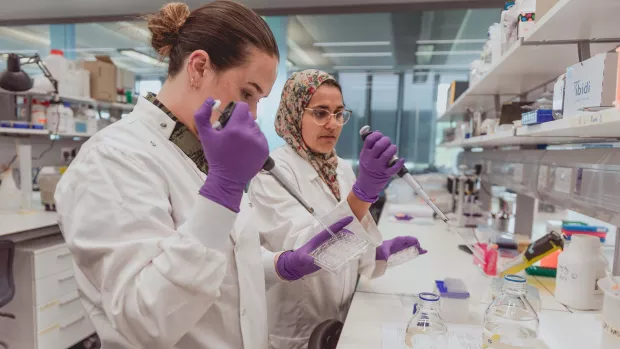
Could we harness the power of pregnancy to stop MS?
Professor Lars Fugger, from Oxford University, is trying to understand why women with MS seem to have fewer symptoms during pregnancy. We recently caught up with him to find out how the research is going.
Back in February, the MS Society announced they would be funding my project to study why women with MS often see an improvement in their condition during pregnancy.
Many women with MS, and other autoimmune conditions like rheumatoid arthritis, have told me that while they were pregnant, their MS symptoms disappeared. And these personal experiences are backed up by research evidence. But we don’t know why it happens.
Looking for answers inside our cells
I’ve had this project in the back of my mind for a while. But we have only recently developed tools that can give us a proper insight into why we see this effect of pregnancy.
Over the past few years, we have worked with other researchers to collect blood samples from over 100 women.
Collecting samples from women before pregnancy, during all three trimesters, and after they give birth, is a big undertaking. Luckily, lots of women have been really enthusiastic about taking part, as they are just as keen as us to improve our understanding of MS and pregnancy.
Now with the funding from the MS Society, and another charity called Aims2Cure, we’ve been able to start analysing the data. We’re looking inside individual cells to see if we can identify the mechanisms involved in MS symptoms getting better or worse.
Stopping immune attacks
We are approaching this research with an open mind so we’ll let the results tell us their story. But we think the answer lies in how the immune system knows not to attack the baby inside the womb.
When women are pregnant, 50% of the baby comes from the father. Normally, something that is “foreign” to our body is treated as an infection by our immune system and attacked. But during pregnancy this doesn’t happen.
In MS, the immune system thinks that the protective covering around our nerves is an infection and attacks it. So, if we could understand what stops immune attacks during pregnancy, we might be able to use that to stop the immune system from attacking myelin.
Harnessing the body’s natural abilities
I am really excited by the idea that if we can understand why women’s bodies can suppress MS during pregnancy, we could somehow harness that natural ability and use it to stop the effects of MS.
At the moment, drugs that treat MS can sometimes have unwanted side effects, so it would be great if we could mimic the natural processes going on in the body that may suppress MS.
Research we can all relate to
This isn’t the only project in our lab, but it’s the one that seems to provoke the most excitement. I think it’s because everyone can relate to it - we’re all someone’s child or parent.



